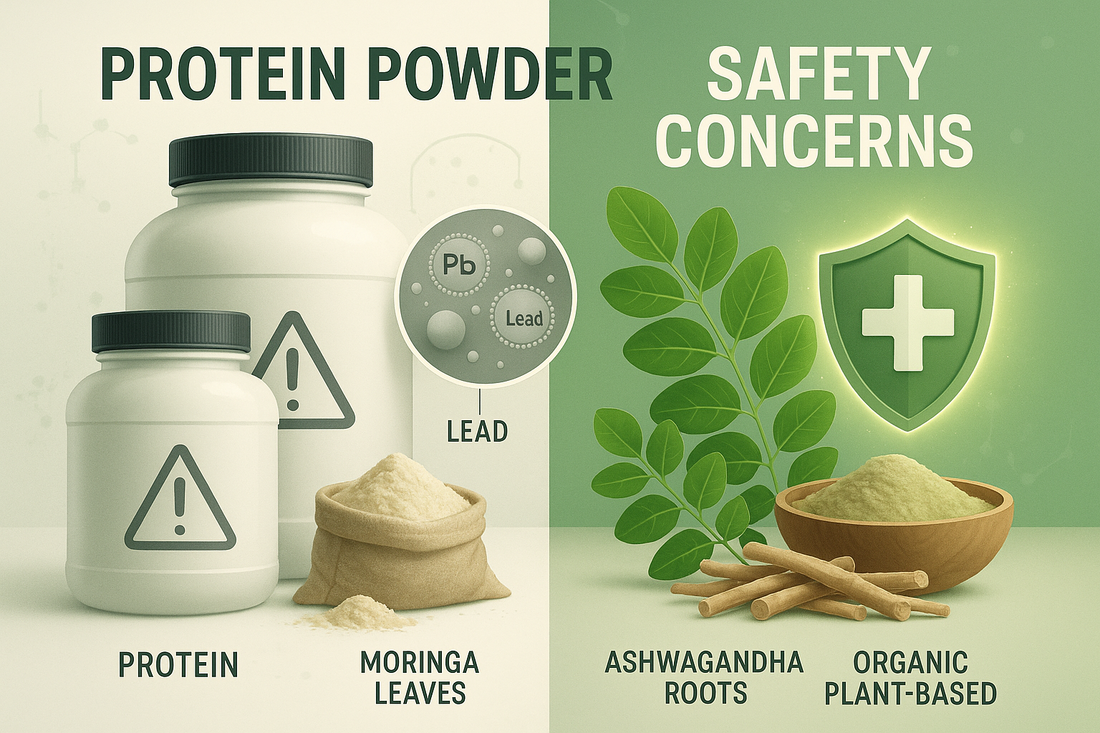
Is Your Protein Powder Safe? The Hidden Danger of Lead Contamination
Share
Protein powders are widely used for fitness, muscle building, and overall nutrition. From athletes to casual gym-goers, many rely on these supplements to meet daily protein needs. However, emerging research has revealed a hidden risk: lead contamination in protein powders. Understanding this danger and learning how to protect yourself is essential, especially for those who prioritize natural and Ayurvedic approaches to health.
This article combines modern medical knowledge with Ayurvedic insights to help you make informed choices about protein powders and overall health.
What Is Protein Powder and Why Do People Use It?
Protein powders are concentrated sources of protein derived from various ingredients such as:
- Whey, casein, or plant-based proteins like soy, pea, and rice.
- They provide essential amino acids needed for muscle repair, growth, and general body function.
People use protein powders for:
- Muscle building and recovery after workouts
- Weight management
- Supplementing daily dietary protein intake
- Supporting overall health, especially when dietary intake is inadequate
While protein powders can be convenient, not all are created equal. Some may contain contaminants, including heavy metals such as lead, arsenic, cadmium, and mercury, posing serious health risks.
Understanding Lead Contamination
Lead is a heavy metal that can accumulate in the body over time. Chronic exposure can cause:
- Neurological issues such as memory loss, headaches, and mood changes
- Kidney and liver damage
- Reproductive problems
- Gastrointestinal issues
- Weakening of bones and teeth
Lead can enter protein powders during:
- Manufacturing process (contaminated equipment or facilities)
- Use of contaminated raw materials, especially plant-based protein sources
- Packaging and storage in unsafe containers
Children, pregnant women, and individuals with compromised immunity are particularly vulnerable to lead toxicity.
Signs of Lead Exposure
Symptoms may not appear immediately but can include:
- Persistent fatigue or weakness
- Digestive issues like constipation or abdominal pain
- Headaches and irritability
- Muscle and joint pain
- Cognitive difficulties in adults and developmental delays in children
Early detection is important. Blood tests can reveal lead levels in the body, and consulting a healthcare professional or an Ayurvedic practitioner can guide detoxification and supportive care.
How to Choose a Safe Protein Powder
1. Check for Third-Party Testing
Look for supplements that are independently tested for contaminants. Certifications like GMP (Good Manufacturing Practices) or NSF Certified for Sport indicate higher safety standards.
2. Research the Manufacturer
Choose reputable brands with transparent sourcing and manufacturing practices. Avoid powders with vague labels or unverified claims.
3. Consider Plant-Based Options Carefully
Plant proteins like rice, pea, or hemp can sometimes absorb heavy metals from soil. Ensure the source is certified organic or tested for heavy metals.
4. Check Labels for Additives
Avoid protein powders with artificial sweeteners, flavorings, or colorings that can compromise overall health.
Balanced nutrition and natural sources of protein
Protein is essential for building Ojas (vital energy), maintaining muscle strength, and supporting overall immunity.
1. Ayurvedic Protein Sources
- Legumes (Dal, Moong, Chana): Easily digestible and rich in protein
- Milk and Ghee: Promote muscle and bone health when used in moderation
- Nuts and Seeds (Almonds, Pumpkin Seeds, Sesame Seeds): Packed with protein, healthy fats, and minerals
- Sprouted Grains and Lentils: Increase nutrient absorption and digestive efficiency
2. Herbal Support for Protein Metabolism
Certain Ayurvedic herbs support digestion, protein absorption, and tissue repair:
- Ashwagandha (Withania somnifera): Enhances muscle strength, energy, and stamina
- Shatavari (Asparagus racemosus): Supports tissue growth and recovery
- Guduchi (Tinospora cordifolia): Detoxifies the body and improves immunity
- Triphala: Improves digestion, ensuring better absorption of nutrients
3. Digestive Support
Ayurveda emphasizes strong Agni (digestive fire) to metabolize protein effectively:
- Include spices like cumin, coriander, and fennel while cooking protein-rich foods
- Avoid overconsumption of heavy, fried, or processed protein sources
- Maintain a balanced diet with fruits, vegetables, and whole grains
Risks of Over-Reliance on Protein Powders
Even if free from heavy metals, excessive protein powder use can lead to:
- Digestive discomfort (bloating, constipation, or diarrhea)
- Kidney strain in susceptible individuals
- Nutrient imbalance due to missing vitamins, minerals, and fiber
- Potential for hidden contaminants if quality control is poor
Ayurveda encourages obtaining nutrients from whole foods first, using supplements as a secondary support.
Detoxifying and Supporting the Body Naturally
If you suspect exposure to contaminants, Ayurveda offers safe natural ways to support detoxification and recovery:
1. Herbal Detox
- Triphala Churna: Gentle detoxification for the digestive system
- Guduchi and Aloe Vera Juice: Supports liver and kidney function
2. Hydration and Gut Support
- Drink warm water with cumin, coriander, and fennel seeds to aid digestion and remove toxins
- Include buttermilk or herbal teas with ginger and turmeric to soothe the gut
3. Balanced Diet
- Focus on whole grains, legumes, vegetables, and seasonal fruits
- Avoid processed and packaged foods during detox periods
4. Lifestyle Practices
- Yoga and Pranayama: Enhance circulation, oxygenation, and natural detox pathways
- Abhyanga (oil massage): Supports lymphatic detoxification and overall vitality
Combining Modern Awareness with Ayurvedic Wisdom
While modern research highlights the dangers of lead contamination in protein powders, Ayurvedic principles provide practical guidance:
- Prioritize natural sources of protein whenever possible
- Use supplements judiciously and from trusted sources
- Support detoxification, digestion, and immunity through Ayurvedic herbs and diet
- Adopt holistic lifestyle practices like yoga, meditation, and oil massage to maintain overall health
By combining awareness with natural practices, you can safely support muscle growth, immunity, and overall well-being without compromising your health.
For regular health tips & updates visit Ayushakti’s Social Media Pages:
- Facebook – Ayushakti Ayurved | Facebook
- Instagram – Ayushakti Ayurved (@ayushakti)
- Pinterest – ayushaktiayurveda
Get all the updates about Ayushakti Ayurved on WhatsApp directly. Click here to Join our WhatsApp Channel
Ayushakti's mission is to help people in every way possible. Our Ayurvedic experts are available to give you a consultation either over the phone or through a video consultation. We recommend customised diets, home remedies, and detox therapies to help you recover from health problems. Book your consultation now!
If you would like to know the location or visit one of our centres, please click here: https://www.ayushakti.com/home/p/contact
For more information, write to us at info@ayushakti.com or call our toll-free numbers: 18002663001 (India) and +18002800906 (Global).
Blog Author: Dr. Ramchandra Konduskar
Expert Review: Dr Smita Pankaj Naram
Co-Founder, Ayushakti Ayurved Pvt Ltd
Disclaimer: This blog is for educational purposes only. Please consult an Ayurvedic practitioner before trying or consuming any medicines, home remedies or treatments mentioned in this blog. The information provided is not intended to diagnose, treat, cure, or prevent any disease.





